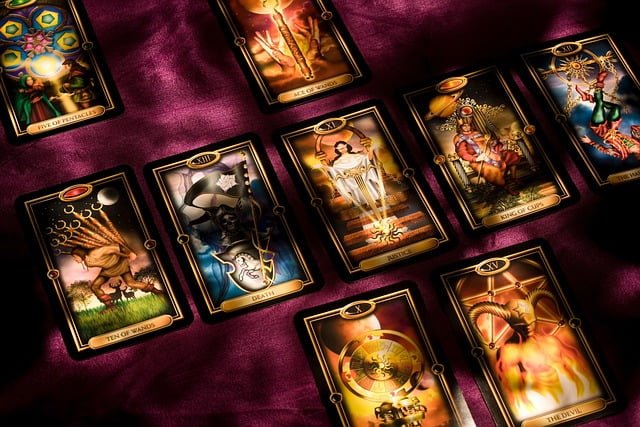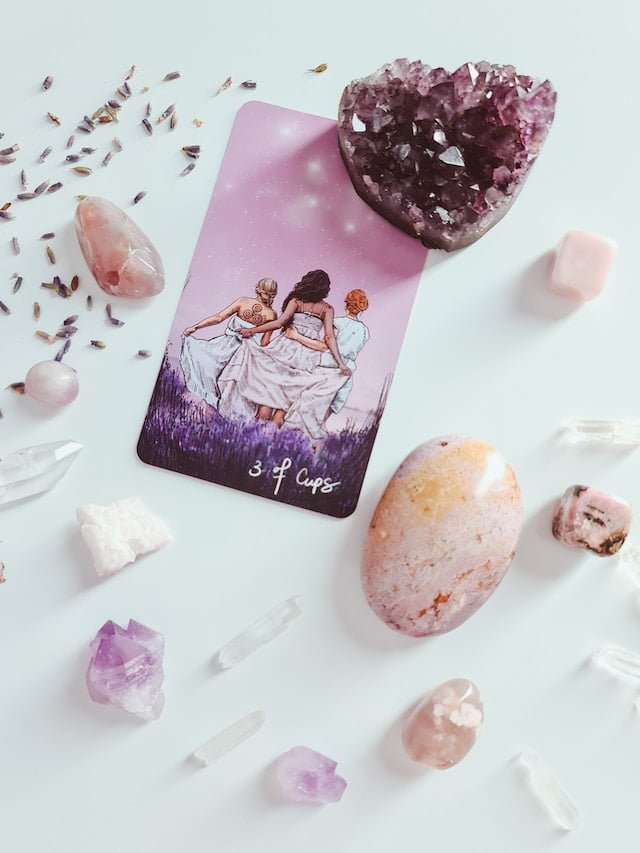Tarot cards have been used for divination and self-reflection for centuries, with their roots tracing back to medieval Europe. While some people swear by their accuracy and insight, others question the validity of tarot readings and worry about the potential negative effects they may have. One common concern is whether tarot cards can ruin your life.
As someone who has been reading tarot for several years, I understand why this question arises. Tarot readings can sometimes reveal uncomfortable truths or difficult situations, which can be overwhelming for some people. Additionally, there are stereotypes and misconceptions surrounding tarot that can contribute to fears about their potential harm. In this article, I will explore the question of whether tarot cards can ruin your life and provide insight into the true nature of these powerful tools.

It’s important to approach this topic with an open mind and a willingness to explore different perspectives. While some may believe that tarot cards have the power to negatively impact one’s life, others see them as a valuable tool for self-reflection and personal growth. By examining the evidence and considering both sides of the argument, we can gain a deeper understanding of the true nature of tarot cards and their potential effects.
Understanding Tarot Cards
Tarot cards are a deck of 78 cards that are used for divination and fortune-telling. Each card has a unique image and meaning, and they are typically used to gain insight into the past, present, or future.
The deck is divided into two parts: the Major Arcana and the Minor Arcana. The Major Arcana consists of 22 cards that represent major life events and spiritual lessons. The Minor Arcana consists of 56 cards that are divided into four suits (Cups, Swords, Wands, and Pentacles) and represent everyday events and experiences.
Tarot cards are not inherently good or bad, but their interpretation can be influenced by the reader’s beliefs and intentions. It’s important to remember that the cards are simply a tool, and their meaning can vary depending on the context and the individual interpreting them.
When using tarot cards, it’s important to approach them with an open mind and a healthy dose of skepticism. It’s also important to seek out reputable readers and to avoid relying too heavily on the cards for major life decisions.
Overall, tarot cards can be a useful tool for gaining insight and self-reflection, but it’s important to approach them with caution and to use them in conjunction with other forms of guidance and support.
The Power of Belief
As someone who has studied and used tarot cards for several years, I believe that the power of belief is an essential aspect of tarot reading. Tarot cards are simply a tool, and it is the interpretation and meaning that we assign to them that gives them their significance.
When we believe in the power of tarot cards, we open ourselves up to receiving guidance and insight from the universe. This belief can be a powerful force that can help us to make positive changes in our lives.
However, it is important to remember that our beliefs can also be limiting. If we believe that tarot cards have the power to ruin our lives, then we may be giving them more power than they deserve. It is essential to approach tarot readings with an open mind and a healthy dose of skepticism.
Ultimately, the power of belief is a personal choice. If you choose to believe in the power of tarot cards, then they can be a valuable tool for self-discovery and personal growth. However, if you choose to be skeptical or dismissive of their power, then they may not be the right tool for you.

Psychological Impact of Tarot Cards
Self-Fulfilling Prophecy
As a tarot reader, I have seen firsthand how tarot cards can impact a person’s psyche. One of the most significant effects is the self-fulfilling prophecy. When a person receives a tarot reading, they may start to believe that the cards’ predictions will come true. This belief can lead them to act in a way that brings about the predicted outcome, whether positive or negative.
For example, if a person receives a tarot reading that predicts a job loss, they may start to worry and become anxious about their job. This anxiety can lead them to perform poorly at work, which can ultimately lead to the predicted job loss. In this way, tarot cards can become a self-fulfilling prophecy.
Anxiety and Fear
Another psychological impact of tarot cards is anxiety and fear. Tarot readings can be unsettling, especially if they predict negative outcomes. This can lead to anxiety and fear, which can be detrimental to a person’s mental health.
For example, if a person receives a tarot reading that predicts a breakup, they may become anxious and fearful about the future of their relationship. This anxiety and fear can lead to irrational behaviors, such as constantly checking their partner’s phone or becoming overly jealous. These behaviors can ultimately lead to the predicted breakup, creating a self-fulfilling prophecy.
In conclusion, tarot cards can have a significant psychological impact on a person’s life. While tarot readings can be insightful and helpful, they can also lead to self-fulfilling prophecies and anxiety. It is essential to approach tarot readings with an open mind and a healthy dose of skepticism to avoid negative psychological impacts.
Tarot Cards and Personal Responsibility
When it comes to tarot cards, personal responsibility is crucial. While tarot readings can be insightful and thought-provoking, it’s important to remember that the cards are not a definitive answer to life’s questions. Instead, they are a tool that can be used to gain insight and perspective.
As someone who has been reading tarot cards for years, I believe that personal responsibility is key to using tarot cards in a healthy way. It’s important to remember that the cards are not a substitute for personal agency or decision-making. Instead, they should be used as a way to gain insight into your own thoughts and feelings.
One way to take personal responsibility when using tarot cards is to approach them with an open mind. This means being willing to consider different interpretations of the cards, even if they don’t align with your initial expectations or desires. It also means being willing to take responsibility for your own actions and decisions, rather than relying solely on the guidance of the cards.
Another way to take personal responsibility when using tarot cards is to avoid becoming overly dependent on them. While it can be tempting to turn to the cards for guidance on every decision, it’s important to remember that the ultimate responsibility for your life lies with you. Instead of relying solely on the cards, use them as a tool to gain insight and perspective, and then make your own decisions based on that information.
In conclusion, tarot cards can be a powerful tool for gaining insight and perspective, but it’s important to approach them with personal responsibility in mind. By keeping an open mind, avoiding dependency, and taking responsibility for our own decisions, we can use tarot cards in a healthy and productive way.
The Role of Tarot Cards in Decision Making
Tarot cards have been used for centuries as a tool for divination and self-discovery. They are often used to gain insight into one’s life, to make decisions, and to gain clarity on a particular situation. However, the question remains: can tarot cards ruin your life?
As someone who has been reading tarot cards for years, I believe that tarot cards can be a useful tool in decision making when used responsibly. Tarot cards can provide guidance and insight, but they should not be relied upon as the sole source of decision making.
When using tarot cards for decision making, it’s important to keep in mind that the cards are simply a reflection of your current situation and the potential outcomes. It’s up to you to interpret the cards and decide how to move forward. Tarot cards should never be used to make decisions for you or to replace your own intuition and common sense.
It’s also important to approach tarot card readings with an open mind and a healthy dose of skepticism. While tarot cards can provide valuable insight, they are not a guarantee of the future and should not be taken as such. It’s important to take the information provided by the cards with a grain of salt and to make decisions based on your own judgement and reasoning.
Overall, tarot cards can be a useful tool in decision making when used responsibly and with a clear understanding of their limitations. As with any tool, it’s important to use tarot cards in moderation and to always approach them with a critical eye.
The Importance of Interpretation
As someone who has been reading Tarot cards for many years, I can confidently say that interpretation is key when it comes to understanding the messages that the cards are trying to convey. The Tarot is a tool that can provide insight and guidance, but it is ultimately up to the reader to interpret the cards and apply them to their own life.
One of the biggest misconceptions about Tarot cards is that they have a set meaning that applies to everyone who reads them. In reality, the meaning of each card can vary depending on the context of the reading and the individual who is interpreting them. This is why it’s important for readers to have a deep understanding of the symbolism and meanings behind each card, but also to be able to apply that knowledge in a way that makes sense for the person they are reading for.
Another important aspect of interpretation is understanding that the cards themselves are not inherently good or bad. While some cards may have negative connotations, such as the Death card, it’s important to remember that these cards are not necessarily predicting literal death or destruction. Instead, they may be indicating a major change or transformation that is necessary for growth and progress.
Ultimately, the importance of interpretation when it comes to Tarot cards cannot be overstated. It’s essential for readers to have a deep understanding of the symbolism and meanings behind each card, but also to be able to apply that knowledge in a way that makes sense for the person they are reading for. By doing so, Tarot can be a powerful tool for self-discovery and personal growth, rather than something that has the potential to ruin your life.

Conclusion
In conclusion, while tarot cards can be a useful tool for self-reflection and personal growth, they should not be relied upon as a sole source of guidance. It is important to remember that the cards are simply a tool and the interpretation of them is subjective.
It is also important to approach tarot readings with a healthy skepticism and not let them dictate major life decisions. It is ultimately up to the individual to make their own choices and take responsibility for the outcomes.
Additionally, it is important to be mindful of the potential for addiction or obsession with tarot readings. If someone finds themselves relying on the cards excessively or becoming overly fixated on the results, it may be time to take a break and reassess their relationship with tarot.
Overall, tarot cards can be a valuable tool for self-reflection and personal growth, but it is important to approach them with a balanced and grounded perspective.
Frequently Asked Questions
What are the potential negative effects of using Tarot cards?
Tarot cards are not inherently negative, but they can be misinterpreted or used irresponsibly. Some people may become overly reliant on Tarot readings and make important life decisions solely based on the cards. This can lead to a lack of personal agency and a sense of powerlessness. Additionally, some individuals may become obsessed with Tarot cards and spend excessive amounts of time and money on readings, which can cause financial strain and social isolation.
How accurate are Tarot card readings?
The accuracy of Tarot card readings can vary depending on the skill and intuition of the reader. Some readers may have a natural gift for interpreting the cards, while others may struggle to provide meaningful insights. It’s important to remember that Tarot cards are not a substitute for professional advice or guidance.
What is the difference between a Tarot reading and fortune-telling?
Fortune-telling typically involves predicting future events, while Tarot readings are more focused on providing insight and guidance in the present moment. Tarot cards can be used to explore one’s thoughts, emotions, and motivations, and to gain a deeper understanding of oneself and the world around them.
Can Tarot cards be misinterpreted?
Yes, Tarot cards can be misinterpreted if the reader is not skilled or experienced enough to interpret them accurately. It’s important to approach Tarot readings with an open mind and to be willing to explore the various meanings and interpretations of the cards.
How can one use Tarot cards safely and responsibly?
To use Tarot cards safely and responsibly, it’s important to approach them with a clear intention and to be open to the insights and guidance they may provide. It’s also important to remember that Tarot cards are not a substitute for professional advice or guidance, and to seek out the support of a trusted therapist or counselor if needed.
What are some common misconceptions about Tarot cards?
One common misconception about Tarot cards is that they are inherently evil or associated with the occult. In reality, Tarot cards are simply a tool for self-exploration and personal growth. Another misconception is that Tarot cards can predict the future with absolute certainty. While Tarot cards can provide insights and guidance, the future is ultimately shaped by our own choices and actions.





